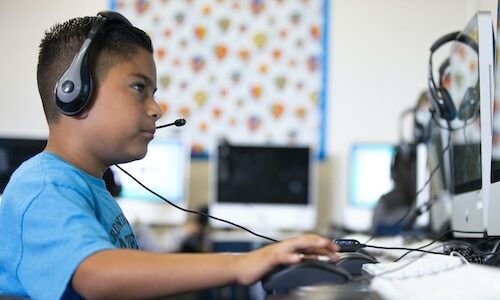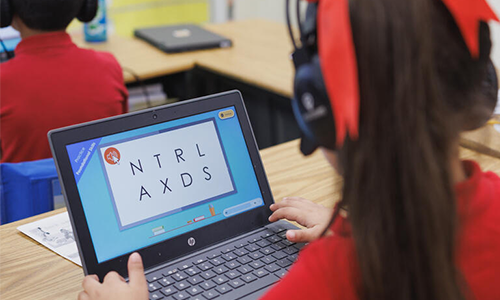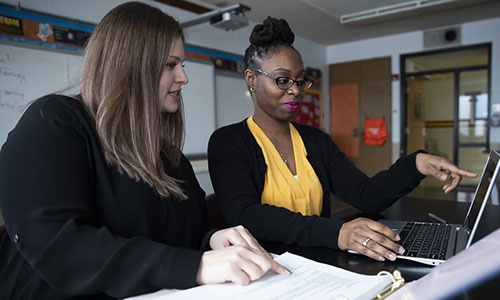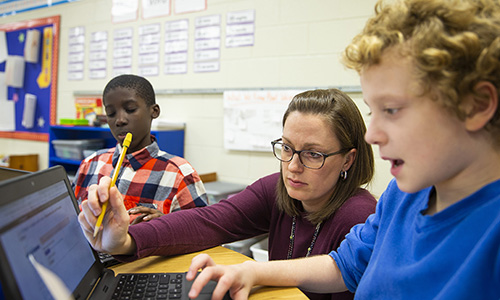A few years ago, I came across “10 assessments you can perform in 90 seconds” by TeachThought and really enjoyed the formative assessment strategies they outlined. Using formative assessment strategies in class during instruction—or “simple assessments,” as they call them—is easy and provides the instant feedback teachers need to identify which learners need more help and adjust their instruction and lesson plans accordingly. Visit the blog above to get more detail on the following techniques:
- New Clothes
- Dos and Don’ts
- Three Common Misunderstandings
- Yes/No Chart
- Three Questions
- Explain What Matters
- Big Picture
- Venn Diagram
- Draw It
- Self-Directed Response
Combining these 10 with 10 others we’ve blogged about in the past gives teachers 20 great formative assessment strategies for checking on student learning. Be sure to click through to learn more about these formative assessment strategies.
- The Popsicle Stick
- The Exit Ticket
- The Whiteboard
- Corners
- Think-Pair-Share
- Two Stars and a Wish
- Carousel Brainstorming
- Jigsaw
- ABCD Cards
- Basketball Discussions
Want more? Here are seven more strategies you can use to elicit evidence of student learning.
- Entrance Tickets. We’ve blogged about and explained the Exit Ticket, so why not have an Entrance Ticket? Here, the teacher asks a question at the start of a lesson, and students write their responses on index cards or strips of paper. Answers are used to assess initial understanding of something to be discussed in that day’s lesson or as a short summary of understanding of the previous day’s lesson. The teacher designs the lesson around the fact that information on student learning will be coming in at the start of the lesson and can be used to improve the teaching and learning in that lesson. Be sure to write the question so it is easily interpreted and analyzed, allows time for you and/or the students to analyze the responses, and leaves space for you to adjust the lesson, if needed.
- Keep the Question Going. With this formative assessment strategy, you’ll ask one student a question and then ask another student if that answer seems reasonable or correct. Then, ask a third student for an explanation of why there is an agreement or not. This helps keep all the students engaged because they must be prepared to either agree or disagree with the answers given and provide explanations.
- 30-Second Share. With this strategy, students take a turn to report something learned in a lesson for up to 30 seconds each. Connections to the learning targets or success criteria are what you’ll be looking for in the language used by the student. Make this a routine at the end of a lesson so all students have the opportunity to participate, share insights, and clarify what was learned.
- Parking Lot. This is an underused strategy for students and one that can surface questions before learning, as well as during and after. This tool also offers an anonymous place for questions that may be directly related to the content or tangential to the current topic and provide insight into student thinking. Simply save a spot on your whiteboard to write down ideas or questions that aren’t completely relevant in the moment but should be revisited later.
- One-Minute Paper. This might be considered a type of exit ticket as it is typically done near the end of the day. Ask your students, either individually or with a partner, to respond in writing to a single prompt. Typical prompts include:
- Most important learning from the day and why
- Most surprising concept and why
- Most confusing topic and why
- Something I think might appear on a test or quiz and why
- 3-2-1. At the end of the learning, this strategy provides students a way to summarize or even question what they just learned. Three prompts are provided for students to respond to:
- 3 things you didn’t know before
- 2 things that surprised you about the topic
- 1 thing you want to start doing with what you’ve learned
- Assessment Reflection. This strategy is a post-assessment reflection completed individually first and then shared in a small group. After an assessment, the teacher provides a list of questions so learners can reflect on their assessment experience. During group discussion, ideas are collected as new information to support students to better prepare for and engage in future assessments. Consider the following or similar questions. You might also use strategies such as Plus, Minus, Interesting, or Plus/Delta.
- How engaged were you with this assessment? Why?
- What did you feel most confident about? Why?
- What did you do that led to your success or confidence?
- What was the most difficult part of this assessment? Why?
- What would you do differently next time?
- What was the most confusing? Why?
- What do you know about the topic that the assessment didn’t allow you to show?
Dig in
All 27 of these formative assessment strategies are simple to administer and free or inexpensive to use. They’ll provide you with the evidence of student learning you need to make lesson plan adjustments and keep learning on target and moving forward. They’ll also give your students valuable information so they can adjust their learning tactics and know where to focus their energies.
If you’re not quite sure where to get started, the following discussion questions can help.
Questions for teachers
- How do you use formative assessment data to inform instructional decisions?
- How can formative assessment strategies foster a learning environment of collaboration and engagement?
- How do formative assessment strategies elicit evidence of student learning?
- What is one strategy you could try tomorrow and why?
Questions for leaders
- How do you use formative assessment data to drive school-wide instructional academic decisions?
- How can you model formative assessment strategies in staff meetings, PLCs, and meetings with teachers?
- What are three formative assessment strategies you could bring to your teachers and staff? Why do you feel these would be most effective at your school?
Get more formative assessment tips and tricks in our e-book “Making it work: How formative assessment can supercharge your practice.”





